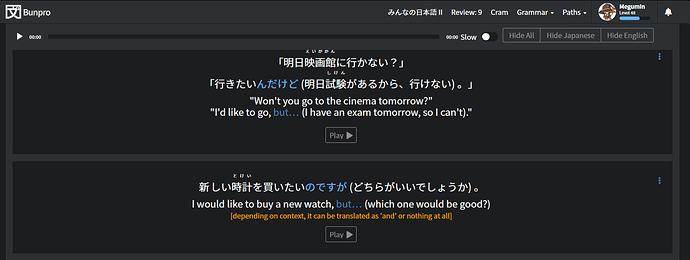but…
and…
Structure
- Phrase + ん + だけ ( れ ) ど (、Phrase2)。
- Phrase + ん / の + ですが (、Phrase2)。
 Versions without ん/の are also acceptable but sound old-fashioned
Versions without ん/の are also acceptable but sound old-fashioned
[Used when the speaker wants to ask for advice about something, request something, etc.・ ほしい、たい、ようと思う、予定 etc. are often used in Phrase1]
[Phrase2 is often omitted if the speaker feels it might be obvious, too frank (often when refusing or stating an opinion), would cause embarrassment for the speaker or listener(s), etc.]









